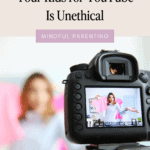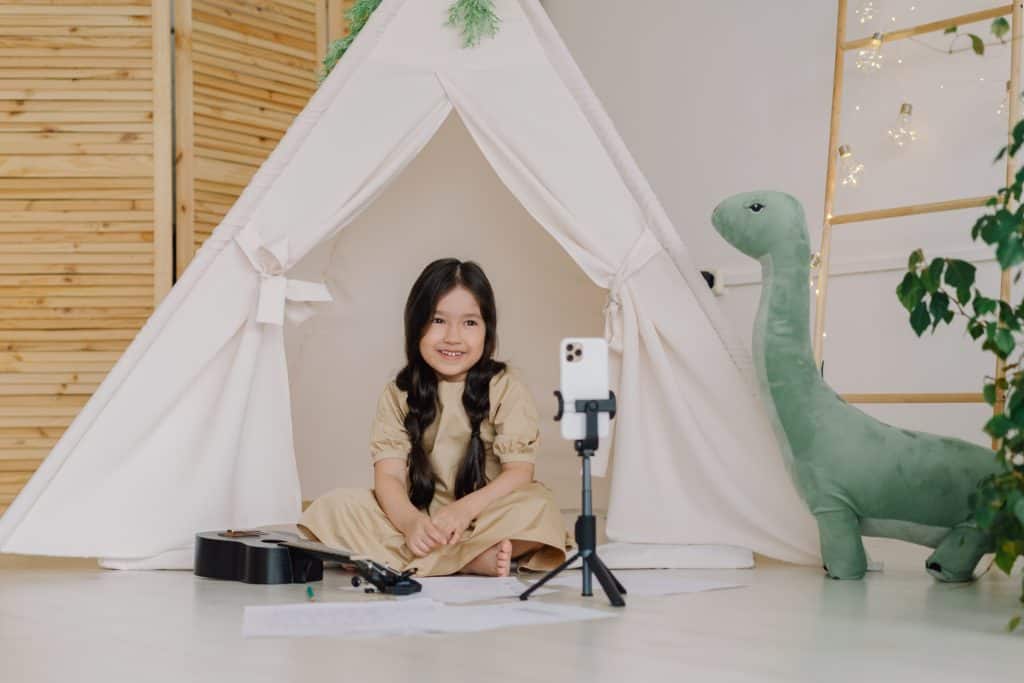
If you’re considering filming your children for YouTube, it’s important to think about the ethical implications.
You may simply see it as a fun way to capture memories, and maybe start a wholesome family channel to make some extra cha-ching, but there are some serious potential risks involved. Currently, filming children for social media without blocking out their faces and concealing their identity is inherently unethical.
Here’s why.
Consent from a child is not informed consent
No matter what your child says about wanting to be filmed or saying that they feel ok with it, you cannot get informed consent from a child to be filmed for YouTube.
- Kids can’t conceptualize what it’s like to have dozens, thousands, or millions of people have access to knowledge of their identity.
- Kids don’t understand the importance of privacy when it comes to being online. They just don’t.
- Kids aren’t aware that having your life displayed online (yes, even little snapshots of it) attracts intense criticism, harassment, and even sometimes physical stalking and cyberstalking.
We (adults and people of the internet) do not even know what the long-term implications of being a Youtube kid are. That data does not exist yet because we’re only just now starting to see people begin to speak out about their experience of growing up as a YouTube kid.
Until we can verifiably measure the impact of having your childhood broadcasted online to anyone and everyone, we will not know what the social, physical, or mental health impact will be for YouTube kids. And even when we do, kids likely cannot give informed consent to that impact because they haven’t experienced those things before and cannot conceptualize what they will feel like as their future self.
Kids can feel embarrassed or humiliated if videos of them are made public regardless of how they felt when they filmed the video
As a parent, it can be tempting to want to capture every moment of your child’s life on video. However, there are some good reasons why you might want to think twice before posting videos of your kids online.
For one thing, kids can be very sensitive about how they are perceived by others. Even if they seem totally unfazed by the camera when you’re filming them, they may feel embarrassed or humiliated if the footage ends up being seen by a wider audience.
Once something is posted online, it’s almost impossible to take it down again. Taking a video down is one thing, but if you have any following on your YouTube channel, you’ll likely have people download your videos.
So if you’re not sure whether your child would be OK with personal moments and memories being forever preserved for public view, it’s probably best to err on the side of caution and don’t upload videos that kids in them.
It’s important to avoid exploiting your children for personal gain
This one is pretty easy to wrap your head around. Filming your kids for a family video that you share with your family and friends is one thing.
Exploiting your children online for personal and monetary gain is another thing. Don’t do that thing.
If there is a compelling argument that exists for why it should be ok to exploit your children for personal or monetary gain, I’ve yet to hear it. Let me know if you have one, though.
The analytics we have show that audiences of videos that heavily feature children are suspect (P-words are likely watching)
It’s true that younger people, moms, and regular, normal people can watch family channels or videos with kids. One group of people find children particularly entertaining, though: pedophiles.
That’s right, according to the current analytics, videos heavily featuring kids are more likely to be watched by people with a sexual interest in children. This is not fear-mongering because we actually have the numbers to show that this is the case.
So if you’re thinking about filming your kids for YouTube, you might want to think twice. Not only could you be putting them at risk, but you could also be helping predators find new victims or children to fixate on.
The emerging data about who watches family channels that focus on children is nothing less than extremely disturbing. This data should be moving YouTube parents and family channels to immediately remove content featuring their kids and avoid filming their children in the future.
Some family channels have made the right move and pledged to stop filming their kids for YouTube and other social media. But other large family channels have been informed of this information and have not responded publicly, continuing to exploit their children online for cash money dollar signs, none of which is necessarily required to go to the children being exploited.
What is ok in terms of having your kids in your videos?
Long story short, I don’t know and I don’t think anyone does. If you’re on YouTube and want to have your kids in your video for a second or two, that might be fine. It’s really up to you and there’s not a lot of data to work with here.
However, you might want to consider concealing their identity by blurring their faces or not filming them.
For example, let’s say that you’re a parenting channel and you sometimes talk about meals or crafts for kids. Here are some ideas you can use:
- Film your kids’ hands as they work on the crafts.
- Include a before and after of your kids’ plates when you serve them the meal and then show how much they ate after they were done.
- Film them from behind, only showing the backs of their heads.
- Just include a couple of images of the craft or food without showing your kids’ faces or any distinctive features.
- Don’t film them; just let the audience know what happened or how it went. You can still film yourself preparing for the craft, meal, or activity.
Where do we go from here? How can we advocate for kids on social media?
Several creators online are doing an excellent job of bringing attention to the ugly truth about who is watching videos of kids online and why it’s essential to stop posting your kids publicly.
There are also a few people (namely over on YouTube) who aren’t giving enough thought about how they approach this.
- Making fun of the parents of children being exploited online and spreading rumors about their sex lives and other intimate details of their relationships isn’t helping kids.
- Talking about influencer moms getting boob jobs and lip injections isn’t helping kids.
Getting a boob job is not inherently harmful to anyone (well, check out breast implant illness because that’s real, but a mom’s boobs are her personal choice.)
FAQs about Child Exploitation on YouTube
I’ll update this FAQ list as I think of or receive more questions about kids on YouTube/social media. It’s an important topic, and I understand that some thoughtful questions and unique situations might arise while exploring it.
If you have a question to add to this list, please leave a comment below or email hey@chillmamas.com to submit a FAQ question.
But what about child exploitation in the film industry?
There’s a big difference between filming your kids for YouTube and allowing your child to be cast in a film or media role. Yes, it’s certainly true that the film industry is suspect in how child actors are treated, but child labor laws are in place to protect them. Additionally, they are paid, so they are compensated for their work. There’s nothing comparable in place to protect YouTube kids.
There are ethical concerns with filming kids for movies, and that’s a great thing to be aware of.
But that has nothing to do with the fact that filming kids for YouTube is unethical because they cannot give informed consent. Using the film industry’s ethical issues as a reason to film your kids for YouTube is a logical fallacy called Whataboutism, which is a variation of the tu quoque fallacy.
In other words, the fact that many aspects of the film industry are unethical does not change the fact that filming your kids for YouTube is unethical.
Those are all bot comments under kids’ content
No, they aren’t. Just because something is unfathomable to you doesn’t mean that those people are bots. Here’s a video showing a few comments under photos of a 13-year-old girl as an example.
@mom.uncharted Reply to @rooster_fart These comments are on a 13 yr old female page 🤢🥺 #parentsoftiktok #fyp #fy #protectthechildren #socialmedia #minorsafety ♬ SUN GOES DOWN – Andreas Roehrig
Pretty gross, right? And also, even if these people are ALL bots (which they’re not) it wouldn’t negate the reasons why putting your children online publicly is ignoring their right to informed consent as well as their right to privacy.
Writer’s note: This post is a work in progress, but I want to get it out there even though I know that there’s a lot of great people doing work in this area. The more voices speaking out about child exploitation online, the better. Please drop a comment below if there’s a talking point, video, or stat you think I should add to this to make it more comprehensive! And thank you for reading.
Featured photo credit: Photo by Mikhail Nilov

